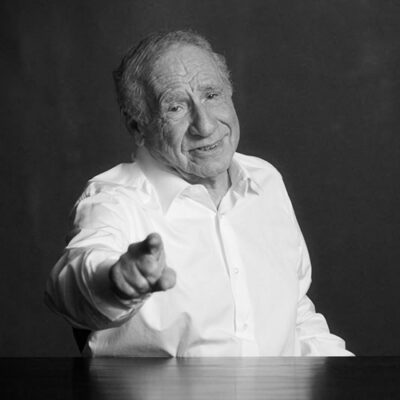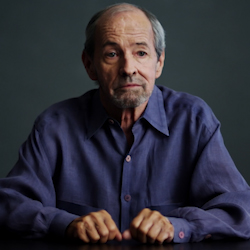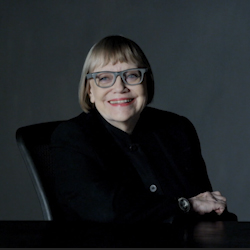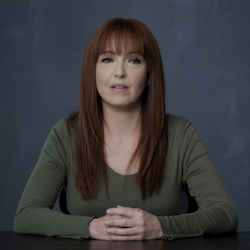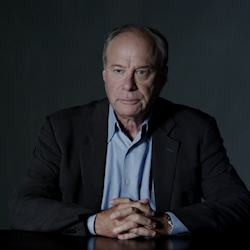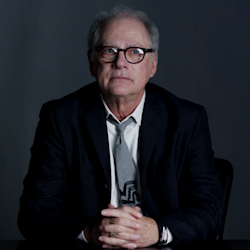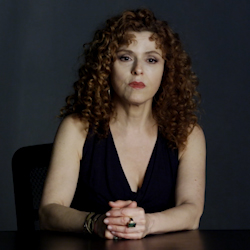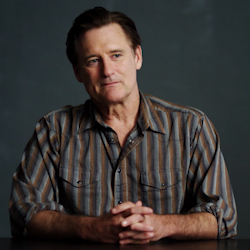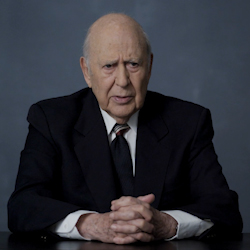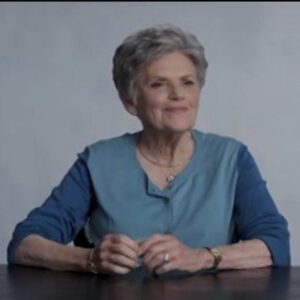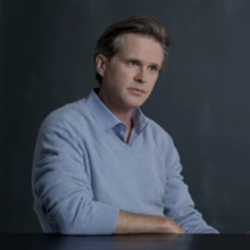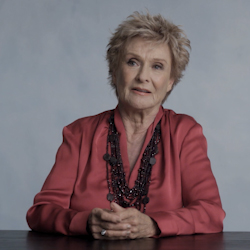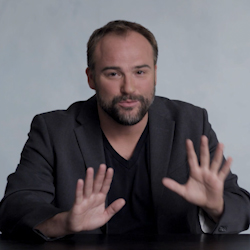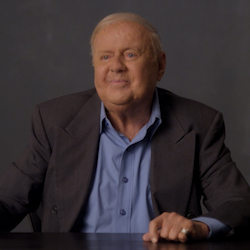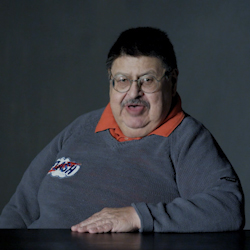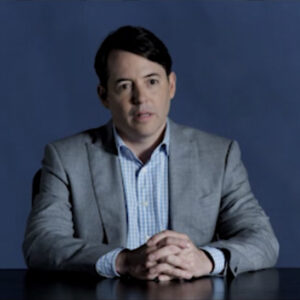Interviewer: So. I wanted to ask you, is there as a choreographer is there a moment and I’m specifically referring to the Springtime for Hitler numer. When you obviously you saw the original movie and when you’re choreographing the number for stage where you say, well, the what they did in the movie in this point is exactly what should be done choreographically so I have to do this.
Susan Stroman: Well no for Springtime for Hitler. You know, the thing is. Well, the thing is, when you start with a screenplay and then you’re going to make it into a musical, you never really go back to that screenplay or go back to that movie again. So when when Mel came to me and we started to now mold that original screenplay into this musical, then I direct and choreograph what is now in the script and don’t refer back to the movie. Well, we got to Springtime for Hitler. It does have sections that it in the theater you accept that if you do one production number that the audience has seen an entire show within a show. And it just needed to have different sections for our our lead character, Roger De Bris, to be introduced as Hitler. And then the other thing in the theater is that you can’t cut like in a movie to a scene. You have to worry about costume changes backstage and changing a set. So it had to be designed theatrically where we had enough time to change the set to to make sure everybody was introduced in a very special way. So it had although it took a nod to what was done originally, it really had to be rethought for the theater.
Interviewer: The reason I ask that is because Matthew, more so than Nathan has said that at times when he had was wondering about stuff he would refer, he would look at the movie again to see to work out a particular thing for himself. So that’s why I’m asking if you had done that.
Susan Stroman: I think that’s probably true for actors, because I I’m sure that Nathan and Matthew feel that they stand on the shoulders of Zero Mostel and Gene Wilder. But in fact, they made it their own. And. And I think when they came out on stage, everyone accepted the musical for a new piece. And then a new piece of theater. And Mel’s wonderful lines were in there. But those performers who starred in The Producers really made it their own, was very special.
Interviewer: Can you give me an example? And we can come back to this if you want to give me a little less on this side. You can give me in. Tell me if we have to come back to. Can you give me an example of something Mel taught you?
Susan Stroman: Well, yes, there’s a famous phrase that Mel would use all the time, and he would said, don’t tap the bell, ring the bell. And he would say that and it would go into my head. And instead of one little lady with walkers, what could be funnier than that? Well, maybe 25 little old ladies with walkers. And we tried it. And, of course, it worked like gangbusters. But it it’s because Mel has these wonderful phrases that he says that really they really do stick with you.
Interviewer: Do you remember of any others?
Susan Stroman: Let’s see. I’ll probably. I’ll think about it as we go.
Interviewer: Did did you do anything that surprised him that you were really.
Susan Stroman: Well, I think Mel wrote the song, I Want To Be A Producer and I don’t think he was happy with it and he wanted to throw it out. And I said, oh, wait, let me see what I can do with it first. Because when I have a song, you know, I have the composers, 32 bars of their song. And then I open it up for a production number and I work with my pianist or my arranger. In this case, it was the wonderful Glen Kelly. And I thought, well, if if Leo Bloom is thinking about becoming a producer, what would that mean? And I’m sure he would think he was surrounded by beautiful girls and how could I get them all in that accounting office. And I thought, well, what if they just came out of the cabinets and the numbers started to grow and then open up where I thought he would imagine his name in Chaser Lights, like on a Broadway marquee. So the number became this huge production number. And I know that when Mel finally saw it in rehearsal, he couldn’t believe that this lovely 32 bar song that he wrote turned into this huge production number. I know he was really pleased.
Interviewer: Was there, during the development, was there a period where because you describe something like that. Or one little old lady with the walker versus twenty five or so, whereas we cannot afford to do this. This getting way out of hand cost wise.
Susan Stroman: When we were working on The Producers, the thing is, it’s it’s really about those performances and about Mel’s wonderful, wonderful words and the dialogue. That that is what is was the real star of The Producers is his dialogue in those performances. And I don’t think there was a time when when we were creating it. And when I was developing it with my designers, where we thought it was too outrageous. It all seemed appropriate and right. And as I presented it to my producers, other producers, they seemed very happy with it all.
Interviewer: Good. This is I mean, listening to this over the past couple days, like you never. I’m like shaking my head in. And you should also say, just to reiterate that it’s how rare it is to start with a set of songs and open with that same set of songs.
Interviewer: Yes. When we went into rehearsal with that score and we worked it all out and we went to Chicago and we opened. I have to say, I, I thought. We would have a sort of a cult following, a Mel Brooks following. I didn’t know the show would do what it did. I mean, you would only hope for that. But in fact, when you’re in rehearsal with the actors and the material, you have these blinders on. You were sort of in a sea of talent and and you just are swimming with wonderful music and words and actors. And you really don’t come up for air until that audience happens. And and the audience is the last element that you add to a collaboration, because you can tell if an audience is bored or you can tell by their breath what you should cut. And so when I we we went to Chicago on that opening night, I really hadn’t come up for air. It was all about creating this musical. And I stood in the back and the laughter was unbelievable. And then the eruption at the end is something I don’t think we’ll ever experience in our lives again. It almost blew the roof off of theater. So I didn’t even realize what we had until that first preview in Chicago.
Interviewer: Wow. And also, it’s not that often that a show becomes it became like a national phenomenon.
Susan Stroman: It did become a national phenomenon, I think, because it was more than just a musical comedy. It was really a comedy musical. And I don’t think anyone had seen a musical that was so filled with comedy. And and it came at the time when there weren’t that many funny shows on Broadway. I think the success of producers opened up a whole new genre of shows because after The Producers opened, then you saw shows like Spamalot and now Book of Mormon. I think producers allowed people to be more outrageous and more and funnier.
Interviewer: In a couple of different ways it sort of changed Broadway.
Susan Stroman: Yes, it changed Broadway in many ways, I know, adjust ticket prices alone. We we we had a show where where people would die to get a ticket to see it because people wanted to laugh. I think it came at a time also where people really did want to laugh. They were searching for that. They needed theater to be more an escapism. And and The Producers brought that to them. And I know after 9/11. I know that that there was nowhere to go in New York where where you weren’t grieving and there was no relief. And the only place that you could go was the theater and the show that could relieve you from that grief for two and a half hours was The Producers.
Interviewer: You closed down for a couple of days during.
Susan Stroman: Yes. Not long though. I think it was like two, two and a half days, maybe three days. And Broadway decided to go back. And we had to because it was all about breaking the spirit. And that’s the one thing they couldn’t take from us, really. So it was about going back and carrying on and doing what you love. And. And The Producers did that.
Interviewer: Were you there the night you guys went back?
Susan Stroman: Oh, yes.
Interviewer: And was it? Did you notice a difference in the audience or?
Susan Stroman: Yes. Yes, I think and I think everybody was very careful. I know Nathan and Matthew came out and spoke to the audience and. And. And just briefly. And welcomed them. And then at the end, instead of seeing our play out song, we sang the national anthem.
Interviewer: Oh. The playout song is hilarious.
Susan Stroman: He has the the play out song actually came from. We worked a lot of the show in my living room. And part of what’s wonderful about collaborating with Mel is that he he feeds off of other people and rather than a writer who locks themself in a room and just writes, you know, he’s everything about Mel is life affirming and joyous. And he would become these characters. He he would become Roger De Bris or Karmann Ghia or Max Bialystock in order to write it and to get that joke. And and he would even become Ulla if he had to. And we’d be sitting around and he would leap up and become these characters, inhabit these characters and speak the words. And the minute he said something funny, you know, we’d write it down. But he he loves to to become these eccentric characters and. A lot of the comedy comes out of these characters being eccentric in a situation rather than being funny characters. They are funny just because they’re wildly eccentric people that have been thrown together. And I think that’s what makes Mel’s comedy so special.
Interviewer: And also in this and in a couple of other movie, Blazing Saddles and the Twelve Chairs, and it’s also an unusual love story in that the guy ends up with the guy. It’s, you know, in a in a really touching way. I mean, Nathan said something that Anne hadtold him it was a he writes a lot of father son stories. The father corrupt the son in this case. But it’s still kind of you know, it’s and it’s an unusual buddy movie.
Susan Stroman: Well, the audience roots for Max and Leo not only to become Broadway producers, but their audience roots for them to become good friends. And I think that’s the success of the musical.
Interviewer: Tell us how you came to become involved with.
Susan Stroman: Well, I guess for years, people were we’re asking Mel to either allow them to make this into a musical or talking to him about doing a musical version of it. And finally, he was ready to do that. And he came to New York and he had his good friend, Tom Meehan. They had done some movies together. And Tom suggested that Mel connect with me and my husband, Mike Ockrent, because we had done a big musical called Crazy for You. And which which ran for a little over five years on Broadway. And then we did we had a huge extravaganza at the Garden of a Christmas Carol that ran for 10 years. And. And we had, of course, done many other things. But I think Tommy thought because of the comedy and in Crazy for You and he thought that we’d be a good team for Mel to meet. So we actually were in rehearsal for Christmas Carol when he called and we got a call that said, Mel wanted to meet you. And we said, well, yes, well, maybe we can meet him next week at a certain time. And the person said, no, he wants to meet you tonight at six thirty. And so, of course, we said yes and we ran home and there he was, bang on time at six thirty was just Mel. The doorbell rang and I was so thrilled because I knew everything about Mel. Every movie. Every line. I was so excited. That was such a fan. So I opened the door and instead of saying hello. He just launched into the song. That face. That face, that face. That fabulous face. And he went right by me, right down my long hallway, dancing to this song that I’d never heard of. And he jumped up on top of the sofa and he looked down and he said, Hello, I’m Mel Brooks. And I thought, well, whatever happens, it’ll be an adventure no matter what. And of course, more than just an adventure happened, you know? But it was something I’ll never forget that first meeting. And he. That song, That Face, he had written for the show, it was like the first song he’d written other than Springtime for Hitler. And of course, that remains in the show today.
Interviewer: And so what happened next? The three of you started working on it?
Susan Stroman: Yes, we started to work. And it was shortly after that, sadly, my husband became ill with leukemia. And we we lost him. I’m sorry, sir.
Interviewer: No that’s alright.
Susan Stroman: I’m sorry. Just a little tissue, I think. Yeah. Thanks. Thank you.
Interviewer: You need our Kleenex for your nose. Why not?
Susan Stroman: I think I’m OK. And so we we didn’t get that far on it, but we were having a delightful time before we lost Mike. And I thought that was the end of it or the last time I would see Mel. But I think it was only about a month later. Maybe it wasn’t even a month. Might have been about three weeks after Mike passed that. Mel asked if he could come over. And of course, I said yes. You know, and he came over and he wanted to, of course bring me his deepest, deepest sympathies. But he also wanted me to go on with the show. He wanted me to direct and choreograph The Producers. I had directed and choreographed the Music Man on Broadway, and I had also created a show called Contact that ran about three and half years up at Lincoln Center. And so I had already directed and choreographed shows. But he he wanted me to go on as the director and choreographer. And I think he recognized something in me that he felt that I could carry on with this. And, you know, he said I didn’t think I could do it just because how about how I was feeling. But, you know, Mel said, Stro, you will cry in the morning and you will cry in the evening. You’ll cry before you see me and you’ll cry after I leave, he says, but you will laugh all during the day. And, you know, it saved me. It really did. It was meant to be that Mel came into my life.
Interviewer: I have yet to hear someone able to say no to him.
Susan Stroman: That’s true.
Interviewer: Because he would just tell you about Joe Bologna. I mean,.
Susan Stroman: Yes.
Interviewer: He just. I don’t know how he gets away with it.
Susan Stroman: No, I know I. I just actually went out and did a huge production at the Hollywood Bowl of The Producers because I couldn’t say no to Mel. And in fact, we had a glorious time. And Mel was very happy. And, of course, that made me very happy.
Interviewer: Yeah, I don’t know another. Believe me, I’ve worked with plenty of schmucks and nobody everybody wants to make him happy. It’s an amazing thing.
Susan Stroman: The thing is about Mel, I don’t know anyone who loves being themselves more than Mel Brooks loves being Mel Brooks. When he walks into a room. It is hello, I’m Mel, and he just loves being Mel Brooks, and I don’t know anybody else who is like that.
Interviewer: But since the age of zero, I mean.
Susan Stroman: Yes.
Interviewer: Because, you know, when you talk to these people from Your Show of Shows. Yeah. Twenty whatever years old. And he was.
Susan Stroman: Yes.
Interviewer: He had that. You know, it’s an odd thing because usually you. And I even ask Carl this. You know, usually people change over it. They their priorities change. Their interests change. And he’s like a straight arrow. It doesn’t.
Susan Stroman: Yes. He makes you, Mel makes you laugh all the time. And and working on the show was joyous. And still to this day, being with him at a restaurant, you know, he’s making all the waiters laugh and and everybody around and the tables are laughing. I mean, he he just loves life and he can find humor in any situation that is around him.
Interviewer: So you start the rehearsals and. Does he repress the urge to direct?
Susan Stroman: No. He was very good. I mean, he I think he understood that it was a new animal for him doing a big Broadway musical. And he was so respectful and and very collaborative. And no, he he let me get on with it and and do it because I had to do a huge journey and a huge arc to make make it all work. And he was wonderful. He would, of course, put his two cents in for some line readings. And I think I’m always fine with that. When a writer wants to do a line reading and I think the actors loved it, you know, I know they loved it because if you’re gonna get a line reading, you should get a line reading for Mel Brooks.
Interviewer: Yeah, we’re gonna reload.
Susan Stroman: And you should allow that and think of it as a gift. I think when once it is presented in the appropriate way, I think actors will would love it.
Interviewer: Did you do the work when it opened in L.A.? Did you do?
Susan Stroman: Yes. Yeah. It was that the same production.
Interviewer: With Martin Short?
Susan Stroman: Yes.
Interviewer: Who I love Martin Short.
Susan Stroman: He is so funny. Oh, he has that spontaneous mind too.
Interviewer: Right.
Susan Stroman: Much like Mel’s mind is real spontaneous.
Interviewer: Did you ever see the interview he did with Mel as Jiminy Glick?
Susan Stroman: Yes. Yes.
Interviewer: It’s it’s hard to get to Mel. And he really got to know, I think, the thing that killed him. What’s your beef with Hitler? That just threw Mel. All right. Are we ready?The show opens and I mean, you’re in Chicago and it’s. I mean really, it just seems like every element falls into place. Right?
Susan Stroman: Yes. In Chicago, everything really did fall into place. The only thing we were running long. The one thing we didn’t add into our equation of timing was all the laughter. And the laughter put us over time. So we had to make cuts. But I went inside of production numbers and carved out time. We carved out a bit of the scenes. But in fact, what we went out with, we came back with. It’s just I sort of carved out the middle of sections or tried to make transitions really fast into the different sets. But we didn’t cut many jokes.
Interviewer: Was there anything that you had to say to him? We have to lose this. I know you love it, but we’ve just got it’s just got to go.
Susan Stroman: No, in fact, no, he was he was very understanding. You know, there is a time that you need to cut off only because of going overtime for crew, and orchestra. But also, there was a time when when you needed you need to tell that story by 10:30, you know, between 8 and 10:30 or an audience does get exhausted from it. So. It was really I think some people think you do need to cut giant sections, but if you really get in there and carve bits out of within scenes and within production numbers, you can take your time off. And that’s and that’s what we did. There was one section we Mel wasn’t happy with, but we couldn’t cut because we couldn’t make the costume change. We had a thing where Hitler had a tap off with with Uncle Sam and and and he couldn’t. We were making a huge costume change in two storm troopers and there was no way we could cut it. So that had to stay. And when we subsequently did the movie, we were able to cut it.
Interviewer: The I guess Nathan was saying also that something that got cut was when he Hitler did the Judy Garland thing. And he was talking. The monologue went on. Yes. And he said it was hilarious, but it just veered off into a whole other.
Susan Stroman: Yes. That the Judy Garland bit down on the edge of the stage with Roger De Bris as Hitler. We did have to take a trim. It was it was quite long, but we had to take a trim in that. And in fact, it’s perfect cause it’s just a nod to that where he sits down and is excited to sit on the edge of the stage like Judy. And and then he gets up and we get on with it.
Interviewer: Whose idea was that?
Susan Stroman: Well, I think Gary Beach would always talk about Judy Garland and he made a reference about Judy one time when when with Roger De Bris, when he was talking to Mel and Mel took the idea and ran with it. And all of a sudden he was sitting on the edge of the stage because Mel does he’s inspired by actors. And, of course, he’s inspired by comic actors and Nathan and Matthew and Gary Beach and Roger Bart, you know, were are so funny. He would stare at them and be inspired by them and come up with more material.
Interviewer: There really is there’s no end to his the inspiration he gets from Hitler. It’s amazing.
Susan Stroman: No, I now know that. I know. And his is a little grandson was backstage the other night at the Hollywood Bowl. And and that he said it at in the dressing room. He said to Mel, you have to tell me about Hitler. He’s about seven years old, six or seven. And Mel says, I have to tell you about Hitler. And he says, yes. Is Hitler a good man or bad man? And Mel looked down at him and said, well, Hitler is a bad man. I said, Why did Hitler make me laugh like that? And then now said, Hitler didn’t make you laugh. I made you laugh.
Interviewer: That’s great. That’s great. Have you ever seen that Curb Your Enthusiasm with Hitler?
Susan Stroman: Oh, yes, of course.
Interviewer: That’s, what’s a Hitler. Yeah. Yeah, that. Yeah, that’s that’s great. I didn’t. That’s very funny because I start when I started going through stuff and I even in Blazing Saddles there’s a when they break through the Warner Brothers lot and there’s Hitler reading variety. They’ve cut me after the bunker scene. Yeah. Yeah. You just always will get a little a little Hitler. I when I was interviewing him the first day, I actually threw him because I said, when did you first become aware of Hitler? And he’d say, Wow, wow. And you haven’t let me think. And it’s like, oh well. And he told me he’s been a part of his arsenal for so long.
Susan Stroman: I know.
Interviewer: Let’s talk about. So after. Well, how did Young Frankenstein come about?
Susan Stroman: Well, after the success of The Producers, it was so joyous, all of it creating it. Everything about it, the run of it going into the back of the theater and watching it, you know, because I do a lot of shows where it comes to a certain point, it’s hard to go back and watch. And now but not The Producers. You could go back anytime and watch it because you would be delighted by the audience reaction. So every part about it was joyous and celebratory. And afterwards, Mel wanted to do it again. You know, I think of all the things Mel has accomplished in his writing and movies and acting everything, writing a Broadway musical I think was the most fulfilling for him and the most fun. And I think he was toying with the idea of doing it again. Sadly Anne got sick. Anne Bancroft and it was almost a reverse roles, where he was grieving so badly and the only thing that could save him would be to write another musical. So we started to writing in and really enjoyed ourselves. And, you know, it’s so collaborative. It’s a it’s a miracle a musical gets up because of the collaboration and and the collaboration, not only with your writers, but your designers, with everyone. And it is everything about it is life affirming. So it can be a very healing experience, too. And I think Mel found that. And it’s interesting how both of us had similar experiences and the musical theater helped to heal.
Interviewer: You know, I want to jump back for one second, because he said he said a great thing about you. He said she took out all the vulgar stuff, cleaned me up and made me look pretty, you know?
Susan Stroman: Well, yes. Every once in a while, Mel could go too far. And there is a certain line, you know, that that you have to to to draw at some point. And. But but he understood that. He totally understood that. You know, the thing is, he his mind is so amazing that. You could go. A lot of different ways. And never forget he you could feed him a line and then he will come back to you. There’s a wonderful moment where he wanted Roger De Bris and Carmen Ghia to have a little spat in front of Max and Leo. And Roger says, I look like the Chrysler Building. And then Carmen Ghia says, but you’re only half dressed without your wig on. And Roger De Bris says, Well, then why don’t you get it, old Wicked Witch of the West? And we had that moment, but we didn’t have a comeback for Carmen Ghia. So I would keep saying to Mel, why did you go get it? Old Wicked Witch of the West? And Mel would say something is not good. And then I keep saying it. And it was. And then finally I said, why did you go get it? Old Wicked Witch of the West? And Mel said, if your intention was to shoot an arrow through my heart. Bull’s eye. And then he turned and he walked down the hall. And of course, that line went in the show. But he he was that idea of becoming those characters, you know, and and he embodies them. And then the humor comes out. It’s so so when you’re collaborating, you are always on your feet trying things and doing things and. And then he has the whole he has the whole idea in his mind. And it’s just getting the exact delivery. You know, the delivery of a line is very important to him. How many? How many, you know, words are in that particular sentence. How, where the period happens. And it’s it’s it’s a craft, but it has to do with rhythm. Mel was a drummer and he still is a drummer. And so he hears the jokes almost like a drummer. There’s a definite rhythm and a definite beat. And if you don’t say it with this rhythm, it’s not as funny. So that is something actually that you can’t teach. An actor, an actor has to have that in him. And Nathan Lane has that, Matthew Broderick has that, Roger Bart, Gary Beach. They have this rhythm inside them where they know how to deliver a line. And we were lucky that we had them in that particular show. I know that when Roger Bart came into audition, he came in to audition for France Lipkin, the Nazi and he wasn’t right for it. And Mel dismissed him immediately. And I was looking at him, watching him walk out of the room and I ran after him and I said, can you come back in and read this part of Carmen Ghia? Yeah. And I said, I know. Be a cold reading and you haven’t prepared, but can you just try it? And he came in in front of us and he read the scene of Carmen Ghia answering the telephone. And he nailed it instantly. And of course, he became Carmen Ghia because I knew there was something in him where he understood the comedy. He just wasn’t being presented to us in the right role.
Interviewer: Have you been stuck? Stuck might be a hard word. Believe you’ve been stuck with actors who didn’t have that rhythm. What do you do with that?
Susan Stroman: It’s well, it’s tricky. You do try to teach it. But it is tricky when a when you know Mel, Mel says you either got it or you ain’t. And he’s right. You there are certain actors who not only have that rhythm, they do something that we call surf the audience where they can be onstage and they can feel the breath of an audience and they know when to go and when to stop, when to tilt their head a certain way to get a bigger laugh. They know they can just feel how an audience is responding to that joke where they could make that laugh go longer. And that’s that’s, again, something you can’t teach. That’s something that’s inherent to certain actors. And, of course, Mel has that and he can tell when to keep going or when to stop and elaborate on that particular joke.
Interviewer: Which is it goes back to your point of it’s a miracle anything gets. Because it’s a crapshoot when something turns out great, you know?
Susan Stroman: Well, it is a miracle musical gets up because of all the departments involved, you know, and that you this I feel the success of any musical is is that collaboration. You have to leave all egos outside and there is no bad idea. You have to throw all ideas on the table and someone will take that idea and come up with something else. But you can’t be afraid to just say things. And so that team become very close.
Interviewer: Well, it’s. And it’s also expected. His. Your Show of Shows where they throw everything out in the room. What do you think that doing The Producers at that point in his career meant to him?
Susan Stroman: Well, I think, you know, that that idea of a producer having two books, one booklet says show to the IRS someone book this has never show to the IRS. Is it is true. I mean, I’ve I’ve had a producer that is in jail today because of that, that I did a big show on Broadway with. But those things happen. And these these people that that we find and The Producers do really exist. There are people like Roger De Bris and there are people like Carmen Ghia and there are people like Ulla. And these people really do exist in our world. We live in a world where there are very eccentric people. So I think for when Mel originally wrote that screenplay, it’s not far from the truth of the world that we live in. And the idea that now to the man who created these characters is now gonna write the music and lyrics and make them sing that. That’s rare, too. Usually you have you take us. You could take a screenplay, but it’s not that particular writer who created those characters that is writing the musical lyrics. So this was unique in every way. I mean, all of Mel’s movies have a nod to a musical in it, you know, whether it’s he and an singing Sweet Georgia Brown in Polish in To Be or Not To Be or High Anxiety. The song High Anxiety, you know, or the cowboy singing in Blazing Saddles, you know, he his every movie that he had made. You can see that he loves the musical theater cause he takes a nod to that in his in his screenplays. So it was it was meant to be that he wrote a musical. It was in him to write this music and. And the fact that he created these characters and now they all sing and dance. It was it was fate.
Interviewer: What was it he told me? And he must have told you this. Was it Joseph Levine or one of those guys? They literally kept the books in Alaska. Did you hear that?
Susan Stroman: Yeah.
Interviewer: It’s like, where are your books? In in Juno. And he wasn’t kidding. He literally came. It was too much trouble to, like, start trying to audit the book.
Susan Stroman: Yes.
Interviewer: The idea of you? Where are your books? Alaska.
Susan Stroman: Alaska. Yes or no. And you know, I’ve worked for producers where all the furniture is on wheels in so we can clear out the office very quickly if you have to get out of town.
Interviewer: Yeah, so. So what was the process any different with Young Frankenstein?
Susan Stroman: Well, it was we. I think there was a lot of the joy of creating was wonderful. Everything about it was wonderful. Rehearsal was wonderful. And in even out of town was terrific. I think it was. Put up to a high, high standard with The Producers, I think. You know, folks were not as gracious about it as I think they should have been. I didn’t know what what. It’s a different story. There are different characters, but somehow they wanted The Producers too, I think. The show ultimately did really well on the road and did three and a half years on the road and did beautifully. But I think in New York, too, the there was a little bit of politics of of theater juggling, theater owner juggling all of that and the politics sort of fed into it. So although it was joyous, writing it and rehearsing it and being out of town with it, we weren’t received as well as we would have loved to and had been. And when we went it back out on the road, you know, we were fine again.
Interviewer: Somebody said something interesting the other day. They said if if Young Frankenstein had opened first, it would have been the reaction of The Producers. It would have been reversed. They said it was just that almost soft, more thing of like they had their knives out for. They didn’t want to see it happen. Lightning hit twice.
Susan Stroman: I think that’s true. I you know, I it’s it’s hard. Like I said before, when we when we go into these rehearsals with all the music and the actors and everything you are are so immersed in it. And then you come up and then there’s the audience. Now the audience, of course, when we were out of town and loved it. But I think they were much more critical when we came back to New York. And it could be that idea of not wanting, you know, lightning to strike twice. There’s that great word in the theater. Schadenfreude in where you, you know, find joy in the misery of others. So, you know, I don’t know why we do these shows. And as as Mel Brooks says, hope for the best and expect the worst. So, you know, we can only hope for the best. And you you feel you’ve done good work. And I know out of all the shows I’ve ever done, Young Frankenstein, the collaboration with the design team is unmatched. There were things on that stage that never been seen before. And for me, as a director, working with designers. That was thrilling for me to have a Tesla on stage and, you know, all the lightning and table rising and all these things had never been done. And so it was very fulfilling.
Interviewer: Tell us about Tony night for The Producers.
Susan Stroman: Tony night for The Producers, you, you. You were in the audience and you couldn’t, couldn’t believe how it kept. They kept saying, The Producers, The Producers, The Producers. It was once in a lifetime event. It, you know, broke all records of the amount of Tony awards that it won. And it still remains the record holder for the amount of Tonys won. It is it’s something I don’t think we’ll ever, ever forget any of us. It was so, so special and everybody had worked really hard on it. It wasn’t that anything was given to us because of anything but hard work and and wonderful collaboration. So there was something about it that was like wild dreams realized for all of us who love the theater so much. And, you know, all of us involved in The Producers have a great passion for the theater. And so then the ultimate place to be, of course, after the joy of our time together was the Tony Awards. And we’ll never forget it.
Interviewer: You know, he talks about. Well, he’s talked about the drumming and everything. And he’s talked about the work with Carl. And he really comes to life when he talks about the stimulus of that. First of all, the feedback, in Carl’s case, having someone to bounce stuff off of in an improvisational way and the purity of the life experience and the and it’s like being a musician, which he is in, in a sense. So it seems like the theater, it it almost is baffling why he didn’t. I mean, I know he did like All American and stuff like that, but that he’s involved with was not as deep as it was in this case. But it’s what I’m trying to say is. I mean, you almost see do you see the musician in him?
Susan Stroman: Well, yes, you can see the musician in Mel, absolutely. When you when you hear the rhythm of his lines, you recognize that immediately. And you know when it’s right. There’s nothing greater than the sound of laughter. It is the greatest sound on the earth. So for Mel in the movies, when he makes his movies, I’m sure he hears the crew laugh, a smattering here and there where or when they’re not supposed to laugh, but to hear an audience laugh at something he’s created eight times a week. You know, it’s.
Interviewer: It’s visceral.
Susan Stroman: Everything about it is healthy. You know, it makes you stronger and happier and everything about it. It’s wonderful and. So I think that’s why. Of all the things he’s accomplished, writing a Broadway musical was most wonderful for him and the most fulfilling, and it has to do with that live audience laughing at everything he’s written.
Interviewer: Let’s reload really quickly and then we’ll wrap it up. I know, Megan.
Susan Stroman: Yes.
Interviewer: It always makes me laugh to hear Please Don’t Touch Me.
Susan Stroman: I know. It’s. I know. That’s terrific.
Interviewer: The lyrics are pretty funny on that. Was it. We’re not rolling. But I interviewed Chloris. But how serious did he get to have her do? I mean, she wanted to do it, but.
Susan Stroman: Yes, she wouldn’t have been able to do it, eight shows a week.
Interviewer: Yeah. It was just her notion that. Yeah. Yeah. Just out of her mind. But she. Did you ever meet with her?
Susan Stroman: Yes. Yes. I actually she was in a production of showboat that I did. So I know no Cloris from. She was Parthy in Showboat. And she did on Broadway for a while.
Interviewer: You know, I don’t know what this. I didn’t even really realize she could. But I guess she even sang on The Mary Tyler Moore Show once in a while. She let out with a little song. We’re just coming back up. Do you have. Do you have photos of you and Mel?
Susan Stroman: I do have some photos. Yeah, I could send to you. We could scan them and send them to you.
Interviewer: That’d be great.
Susan Stroman: Yeah.
Interviewer: Yeah. Because we’re gonna have to. Yeah, definitely. And we’ll find stuff, too, you know. Did Anne pass away during Young Frankenstein or when you were shooting the movie?
Susan Stroman: It was right after it was done while we were editing the movie. We had done shooting, we were editing.
Interviewer: BUT Young Frankenstein hadn’t come up yet?
Susan Stroman: No, No, we did Young Frankenstein after the movie.
Interviewer: And you shot the movie in LA though, right?
Susan Stroman: No in New York here.
Interviewer: That’s what I thought.
Susan Stroman: At Steiner Studios.
Interviewer: At Steinar, right.Yeah, it’s an odd reverse situation. That Hitler thing. It’s amazing cause I’m trying to figure out how to structure this whole thing in my head, and I said to now, you know, I’m thinking of taking a non-traditional route and doing chapters. And I said to him obviously you would have like a Carl chapter and you would have a Hitler chapter, and he looked at me and. But that story is amazing from the Hollywood Bowl. That’s just incredible. So that’s goes right into the Hitler chapter. Yeah. And actually, for the for the TV audience, I think it’d be pretty funny to have, like, chapter heading Hitler and things.
Susan Stroman: I have another. There’s another. I’ll say, are you rolling?
Interviewer: Are we rolling? Ok.
Susan Stroman: When we first were in previews, I was I was a little worried. I didn’t know how an audience would take to Springtime for Hitler. And I I know when I be Herston in New York, I would have stage management pull the shades down in the room because I was afraid that apartment buildings from across the way would see me lining people up, you know. So we tried to keep it contained because out of context, it doesn’t work. So I was a little worried. One of the things I kept saying to Mel’, well, we have to keep saying what the plot is. We have to find the worst show ever written. We had to pepper that throughout just to keep laying it out there for the audience. And that during one of our first previews in New York, it was going very well. And there was an older gentleman who was sitting in the front row enjoying it, loving it. Looking at all the showgirls, having the time of his life until Hitler sat on the edge of the stage as Judy Garland and all this man could see was Hitler’s five inches from him. And he jumped up and he started to storm out of the theater screaming about how could you do this with Hitler? And of course, this had been my biggest fear. And I thought this was going to happen all the time, but it only happened this one time. And he was storming out of the theater and there he saw Mel in the background. And he went, you! And I thought Mel was going to calm him down and say, oh, no, sir, you know, you weren’t listening to the plot or something. But he said, you! How could you do this? I was in World War Two, and Mel jumped up and he said, you were in World War Two? I was in World War Two, and I didn’t see you there. And so. So all of a sudden, these two men were fighting in the back of the house, you know, and we have a wonderful one of our producers, Laura Greene. She just grabbed them both by the collar and pulled them out of the theater and threw them out to the street, you know, to finish their argument. And I think finally it settled down. But it only happened that very one time and it never happened again. And, you know, and I think it’s because of the writing we were quite careful of of peppering it with we are looking for the worst show ever written, and that could only be Springtime for Hitler.
Interviewer: Were there any discussions about how sensitive to be or not to be with the gay jokes?
Susan Stroman: Well, that’s what’s interesting about the gay scene is, Mel wrote a song called Keep It Gay, but never refers to that word as being homosexual. It’s all about being funny and being light and being charming and being jovial. And that’s what gay means. So he does an entire number. Saying keep it gay, but it means about being lovely and happy. And it’s just sung by a man in a dress and with an assistant and a catsuit. But he but I think that’s genius. Really, really genius. And he always said that. If anyone was afraid of the gay scene by the end of that scene, you would want to be in Roger De Bris’ apartment. And that’s what he accomplished. You know, you go go into that open into that set and it’s all pink and, you know, lip cushions and, you know, you’re a little nervous. And by the end of the show, you wish that you were up there with all of them and and visiting Roger De Bris because it’s so much fun.
Interviewer: Is there anything I’m forgetting?
Susan Stroman: Gee, I dont know.
Interviewer: I mean, have you seen from the from when you first start working with him till last weekend or some, have you seen any changes in him or.
Susan Stroman: No, I mean, Mel is with. With me, it’s it’s it’s always joyous and gracious and he’s unbelievably respectful. And in the end, that’s how you do your best work with each other. It’s that respect. And it is continued to be that way. You know, when I when I saw him last week and and he’s always kind and he’s very generous. I think there’s something about the fact that Mel has made everyone laugh their whole life, that there’s an accessibility to Mel. I know when you see some movie stars, you certainly get a vibe right away that you can’t go up to them or you wouldn’t go up to them. But because Mel has made you laugh, everyone wants to go up to him and thank him for that. And I’m sure that he’s like he did with me. Healed many people with his laughter.
Interviewer: You know, I can’t think when I start when they brought me onto this, I was. People are what are you gonna do now? I tell them and their faces lit up. And, yeah, I can’t. Throw a name out if you can think of one. Him, Carol Burnett. Not many people I can count on one hand where you say their name and people light up.
Susan Stroman: Yes. I know.
Interviewer: I mean it’s it’s very visceral with him. And I don’t even know who. I honestly don’t know who else you could where people have such a built in. You know, it’s a kick start response of auto auto respond. They just this smile and it’s.
Susan Stroman: Well, there’s no one like Mel. He is one of a kind. And the characters that he writes, they are one of a kind. There’s no one like those characters. And, you know, I think the success of The Producers musicals, because we had a cast, those actors are one of a kind. And I think that that was a big success. Added to the big success of the musical too.
Interviewer: Thank you so much.
Susan Stroman: Thank you.

